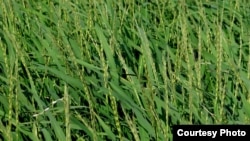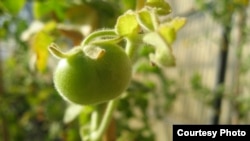The tough but unpopular cousins of two favorite food crops have yielded their genetic secrets. Hardier, tastier tomatoes and more resilient rice for a hungry planet are among the goals.
In two reports in the journal Nature Genetics, scientists have published the genomes of African rice and a wild relative of the tomato.
There are good reasons why these two never really caught on the way their better-known kin did. The Asian species of rice is more productive and easier to process than African rice. The wild tomato, Solanum pennellii, is poisonous.
But experts say they have other virtues. For one, they can grow in harsher environments, an increasingly important trait in a changing global climate.
Food for a crowded planet
Climate change is complicating crop production, even as the number of people needing to be fed is expected to grow by 2 billion or more in four decades. “And that’s a pretty scary scenario,” said University of Arizona plant biologist Rod Wing.
Wing said scientists around the world are working to develop more productive rice varieties that require less water, fertilizer and pesticides, and can grow on less productive land.
African rice can better handle drought, poor soils and weeds than Asian rice.
With the complete DNA sequence that Wing and colleagues published, scientists can now try to find the genes that control those traits and breed them into new rice varieties quicker than before.
Tomato's country cousin
Similar motives drove the researchers who sequenced the genome of the wild tomato.
This South American plant can tolerate the dry conditions in its Andean homeland better than conventional tomatoes, and can handle saltier soils.
The detailed new genetic map identified the genes likely responsible for these traits.
And it could help rescue the notoriously bland supermarket tomato. The researchers found differences between wild and commercial tomatoes in the genes that contribute to tomatoes’ flavor and aroma.
“Even though these wild tomatoes definitely don’t taste better, this population gives us an indication of where the taste is coming from,” said bioinformatics expert and study co-author Bjorn Usadel, currently at RWTH Aachen University in Germany.
Usadel added that the genome data will also help ensure that new varieties bred from the wild tomato do not carry any of its poisonous genes.
“Even though this is a perfectly natural way to do things, of course we have to make sure that the tomatoes that result are really healthy and useful for consumers,” he said.





